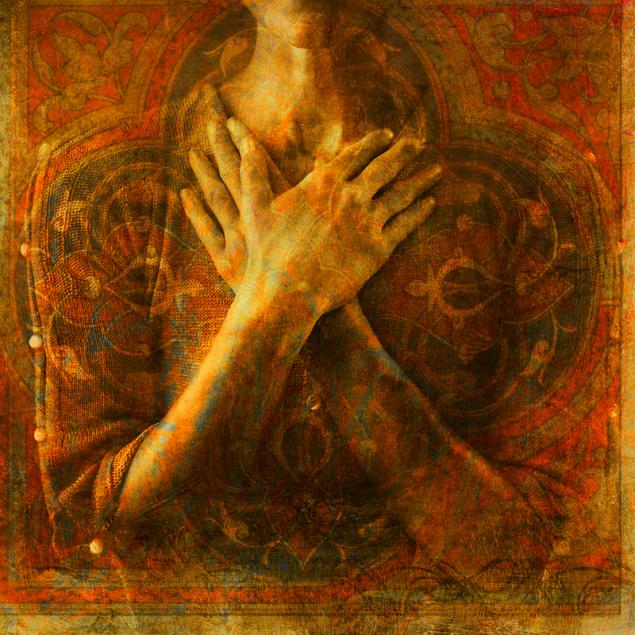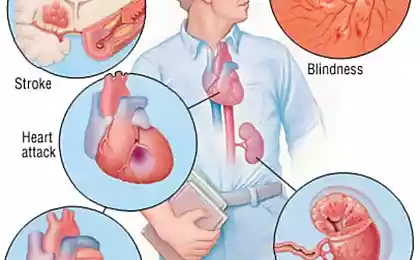507
Psychosomatics hypertension
Today, according to statistics almost a fifth of the world's population suffers from hypertension.
Hypertension - increasing the pressure in the blood vessels caused by increased tone of their walls. If the tone of the vessel walls is increased, as a result, the vessels are narrowed, and as a result of increased pressure in the bloodstream. Everything is interconnected in the human body.
The autonomic nervous system on the one hand is directly related to emotions, and on the other - of our vascular tone controls. Thus our emotional state, regardless of our desire to direct the work of our internal organs.

When a person something to put pressure, be it psychological or physical factors, the body begins to resist: muscles tense, the heart starts beating faster, increasing blood flow to meet the increased demand of muscles and internal organs they need oxygen and other substances.
Thus, the body tends to balance the external pressure is internal. If the situation is tense after a while discharged and is the exception rather the rule than the norm, then over time the vessels return to normal and the pressure is normalized.
But if negative emotions bursts occur on a regular basis, then after a while the vessels will no longer have time to come back to normal, and blood pressure in humans will be steadily increased. Hence the conclusion: between negative emotions and high blood pressure is a direct connection
. Many psychologists believe that the cause of a disease in a human being is his world, his perception of the world.
Blood pressure is a measure of how a person relates to different events and overcomes obstacles in the path of life. The nature of the majority of hypertensive patients have a lot in common. Hypertension affects people who have long experience internal tensions, which is the consequence of various fears, mistrust, reluctance to accept this or that situation. Therefore, to cope with the disease, is not enough to drink tablets.
The situation really can change, but only if the person will be more flexible, will begin to change, start to work with their own convictions.
It is always difficult to admit that you might be wrong, it is difficult to abandon the usual views on a particular situation, the relationship, to life. Such work requires to expand its horizons, it requires recognition of the host of negative emotions such as aggression, anger, anger, resentment.
And against such recognition often protesting all the natural man, because it is widely believed that experience negative emotions is a bad thing that the person experiencing them - bad man
. So many people instead of learning these emotions perfectly natural right to exercise and release, restrain and suppress them, which leads to the formation of energy blocks and clamps.
And if it happens regularly for a long time, sooner or later there is a "burst" scandal, corrupt relationships, and eventually emerge health problems.
That is why it is so important not to suppress negative emotions, and freed from the heavy load that they represent.
Hypertension - increasing the pressure in the blood vessels caused by increased tone of their walls. If the tone of the vessel walls is increased, as a result, the vessels are narrowed, and as a result of increased pressure in the bloodstream. Everything is interconnected in the human body.
The autonomic nervous system on the one hand is directly related to emotions, and on the other - of our vascular tone controls. Thus our emotional state, regardless of our desire to direct the work of our internal organs.

When a person something to put pressure, be it psychological or physical factors, the body begins to resist: muscles tense, the heart starts beating faster, increasing blood flow to meet the increased demand of muscles and internal organs they need oxygen and other substances.
Thus, the body tends to balance the external pressure is internal. If the situation is tense after a while discharged and is the exception rather the rule than the norm, then over time the vessels return to normal and the pressure is normalized.
But if negative emotions bursts occur on a regular basis, then after a while the vessels will no longer have time to come back to normal, and blood pressure in humans will be steadily increased. Hence the conclusion: between negative emotions and high blood pressure is a direct connection
. Many psychologists believe that the cause of a disease in a human being is his world, his perception of the world.
Blood pressure is a measure of how a person relates to different events and overcomes obstacles in the path of life. The nature of the majority of hypertensive patients have a lot in common. Hypertension affects people who have long experience internal tensions, which is the consequence of various fears, mistrust, reluctance to accept this or that situation. Therefore, to cope with the disease, is not enough to drink tablets.
The situation really can change, but only if the person will be more flexible, will begin to change, start to work with their own convictions.
It is always difficult to admit that you might be wrong, it is difficult to abandon the usual views on a particular situation, the relationship, to life. Such work requires to expand its horizons, it requires recognition of the host of negative emotions such as aggression, anger, anger, resentment.
And against such recognition often protesting all the natural man, because it is widely believed that experience negative emotions is a bad thing that the person experiencing them - bad man
. So many people instead of learning these emotions perfectly natural right to exercise and release, restrain and suppress them, which leads to the formation of energy blocks and clamps.
And if it happens regularly for a long time, sooner or later there is a "burst" scandal, corrupt relationships, and eventually emerge health problems.
That is why it is so important not to suppress negative emotions, and freed from the heavy load that they represent.
Live plants can become the prototype of the future of solar batteries
How do art from the Renaissance to the present day
























